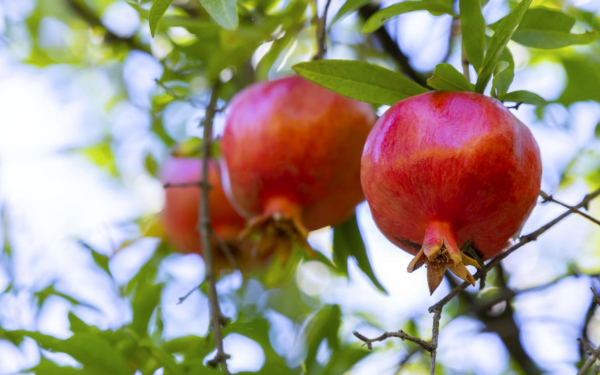
ផ្លែទទឹម ដែលត្រូវគេហៅថាជា “ស្តេចផ្លែឈើ”។

The pomegranate, known as the ‘King of Fruit’, is not only delicious and visually appealing but also rich in medicinal properties, making it a revered gift from nature. Throughout history, it has been mythologized and honored in various religions and cultures around the world.
In ancient Greek mythology, the pomegranate was associated with the underworld. In Jewish tradition, it is believed that the fruit contains 613 seeds, each symbolizing a commandment in the Torah.
Originating from the region between Iran and northern India, the pomegranate shrub (Punica granatum) quickly spread to the Mediterranean and as far east as China. This fruit is a beloved staple in many Middle Eastern cuisines and holds a place of high regard in countries like Turkey, Armenia, and Iran.
Particularly in Azerbaijan, a South Caucasian nation, the pomegranate, known locally as ‘nar’, is celebrated more than anywhere else, achieving an almost sacred status as a national symbol.
ផ្លែទទឹម ត្រូវបានគេស្គាល់ថាជា ‘ស្តេចផ្លែឈើ’ មិនត្រឹមតែមានរសជាតិឆ្ងាញ់ និងទាក់ទាញសម្រាប់ភ្នែកប៉ុណ្ណោះទេ ប៉ុន្តែថែមទាំងសម្បូរទៅដោយលក្ខណៈសម្បត្តិឱសថ ដែលធ្វើឱ្យវាក្លាយជាអំណោយដ៏គួរឱ្យគោរពពីធម្មជាតិ។ ពេញមួយប្រវត្តិសាស្រ្ត វាត្រូវបានទេវកថា និងកិត្តិយសនៅក្នុងសាសនា និងវប្បធម៌ផ្សេងៗជុំវិញពិភពលោក។
នៅក្នុងទេវកថាក្រិកបុរាណ ផ្លែទទឹមត្រូវបានផ្សារភ្ជាប់ជាមួយនឹងពិភពលោកក្រោម។ នៅក្នុងប្រពៃណីរបស់ជនជាតិយូដា វាត្រូវបានគេជឿថា ផ្លែឈើមាន 613 គ្រាប់ ដែលនីមួយៗតំណាងឱ្យបទបញ្ញត្តិនៅក្នុង Torah ។
មានប្រភពមកពីតំបន់រវាងប្រទេសអ៊ីរ៉ង់ និងភាគខាងជើងនៃប្រទេសឥណ្ឌា ដើមទទឹម (Punica granatum) បានរីករាលដាលយ៉ាងឆាប់រហ័សទៅកាន់សមុទ្រមេឌីទែរ៉ាណេ និងឆ្ងាយទៅភាគខាងកើតនៃប្រទេសចិន។ ផ្លែឈើនេះគឺជាអាហារដ៏ពេញនិយមនៅក្នុងម្ហូបមជ្ឈិមបូព៌ាជាច្រើន ហើយទទួលបានការគោរពខ្ពស់នៅក្នុងប្រទេសដូចជាទួរគី អាមេនី និងអ៊ីរ៉ង់។
ជាពិសេសនៅក្នុង Azerbaijan ដែលជាប្រជាជាតិ Caucasian ខាងត្បូង ផ្លែទទឹមដែលគេស្គាល់ក្នុងស្រុកថា ‘nar’ ត្រូវបានប្រារព្ធច្រើនជាងកន្លែងផ្សេងទៀត ដោយទទួលបានឋានៈស្ទើរតែពិសិដ្ឋជានិមិត្តសញ្ញាជាតិ។
